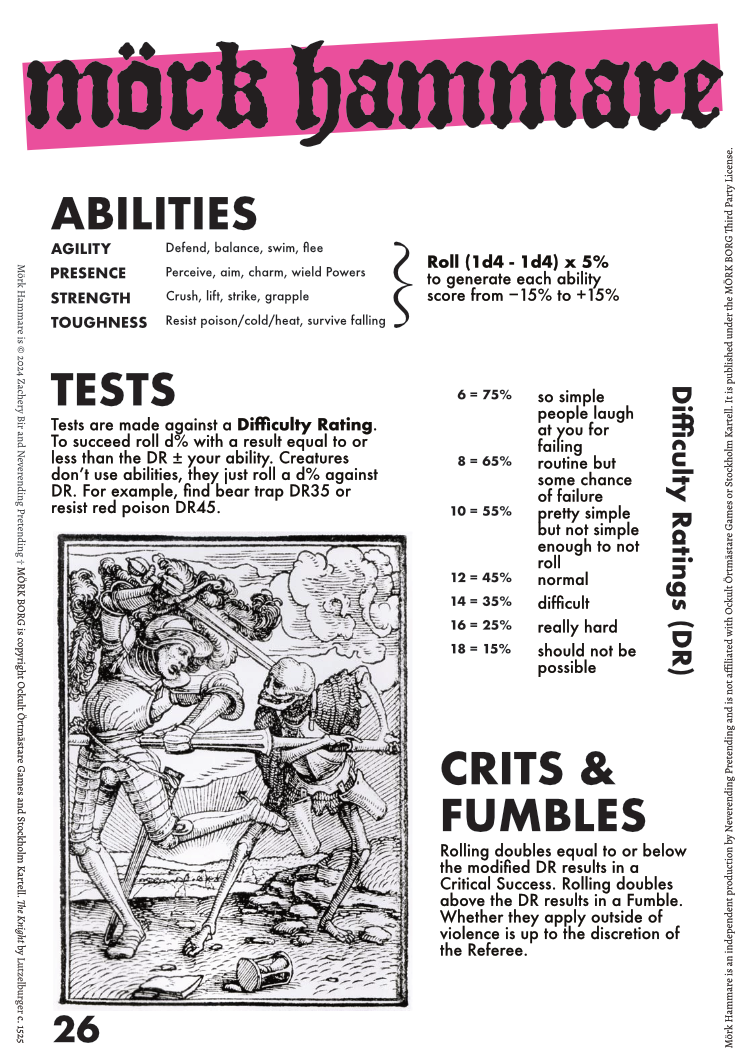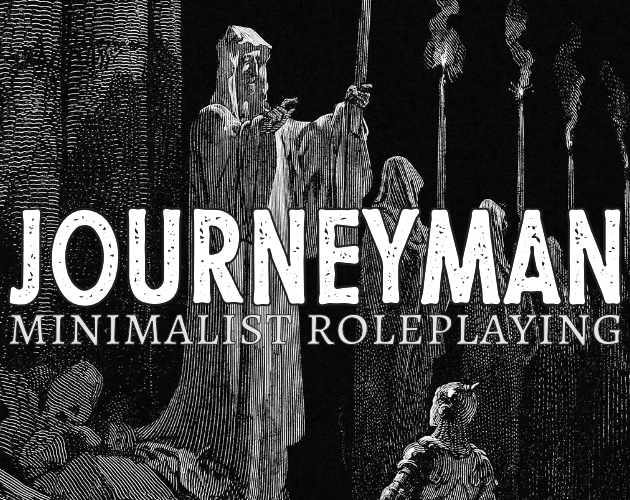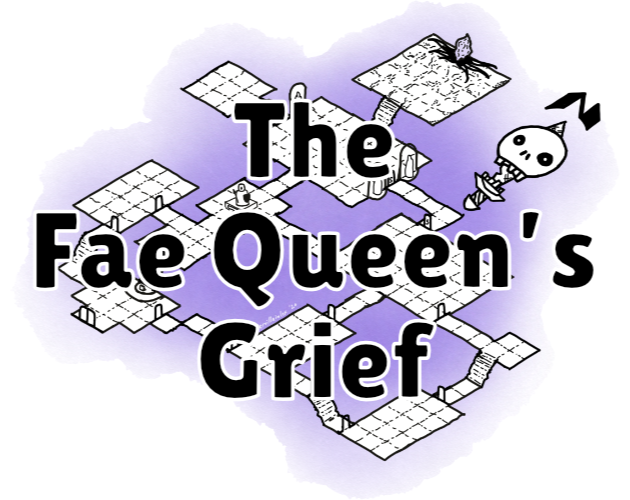-
Mörk Hammare
I hang out with some fine folks who enjoy Warhammer Fantasy Roleplay a whole bunch. Equally enthusiastic among its three editions: first, second, and fourth. When Ben Tobbit announced a new Mörk Borg-derived system called Black Power and Brimstone with a Free Quickstart, comparison to WFRP and The Old World was guaranteed to follow.
Now, many of our conversations around WFRP center around how much are folks playing WFRP the system vs. how much are folks playing WFRP the setting and how much or little the two can or should be coupled.
Many suggestions have been proffered for a system replacement for WFRP, and some of them even present settings that are more closely aligned with the Grim World of Perilous Adventure: Kriegsmesser, Warlock!, Best Left Buried, Shadow of the Demon Lord. Even Mörk Borg itself ratchets up the camp and dreariness of the most outlandish WFRP motifs. But Black Powder and Brimstone purports to offer a world closer in tone, technology, and culture to that of The Old World.
When one of my friends expressed a little dismay that if they were to go the BP&B route, they’d be “playing WFRP with a d20”. So, recognizing that Mörk Borg’s action resolution is pretty localized to one real page of rules (p. 26), I came up with a drop-in replacement that uses percentile dice and roll-under-or-equal-to, just like WFRP: Mörk Hammare (“Dark Hammer” in Swedish). And because most Mörk Borg derivatives use the same resolution, it can easily be ported to CY_BORG, _Death in Space, Pirate Borg, Frontier Scum, Cast Away, Farewell to Arms, and more.

-
Just Use Luck
Every game provides a mechanism to determine the success or failure of a character’s actions. Whether testing abilities, skills, saves, attacks, dodges, or senses, all these boil down to:
"Do I have better, worse, or indifferent odds of accomplishing what I’m trying to do here?"
And so, every roll in a game is a Luck roll. All that changes from situation to situation is the fictional positioning of the character (Luck favors the prepared, after all). If no roll is being made, Luck isn’t being courted. The action is either impossible or it’s a fait accompli.
I wanted this to be the heart of the way Journeyman works. The aspects of a character neither offer an inherent benefit, nor impose an inherent penalty. They merely describe the character and offer affordances for the referee in the moment to determine whether or not they affect the situation. Fezzik's gigantism provides ample advantage when it comes to intimidating a portcullis guard, gives him even odds when wrestling a white ape of Barsoom, but would work against him if he were attempting to squeeze through a narrow cave fissure deep in the Great Underground Empire.
None of this removes the suspense of not knowing the outcome of an action, and none of it removes player or referee agency. So the next time you're in a position to adjudicate a situation, see if you can’t reframe the action to answer a simple question: Who has Luck's favor?
-
Journeyman: Reborn

After stewing on the previous incarnation of Journeyman, I decided to strip it down to the bone and build it back up to something I think is a light, extensible, and expressive framework that can support any number of settings and genres.
I had a few guiding principles. It needed:
A consistent way to resolve tasks when randomness is needed.
I wanted to avoid minigames and multiple, sometimes inconsistent, subsystems for different aspects of the game. "2d6, roll high" is an extremely simple concept to keep in mind for task resolution.
As little character quantification as possible.
I enjoy games that take a more literary approach to character design, and I wanted to see what players could come up with in an unbounded playing field.
No power bloat.
The protagonists in stories I enjoy rarely get tremendously more powerful as time goes on. Typically, they improve by getting new equipment or gaining allies. I wanted to have a game that explored that kind of growth without such a focus on increasing numbers on the character sheet.
No reliance on any dice beyond d6.
Admittedly, this is a purely stylistic stance. I collect all sorts of dice, and enjoy chucking them when I can, but I relish the simplicity of the d6 and wanted to hew close to the Traveller roots.
[I love you, too, d12, we all know you're the perfect polyhedral die.]
So, I've released its new incarnation, and you can download it on my itch.io page
-
Introducing the Journeyman Engine
I’d like to introduce you to a homebrew system I’ve been working on recently. I call it the Journeyman Engine, and it
comprises elementssteals liberally from some of my favorite Odd Borg Hack games.I was hoping to create a lightweight system that supported rich and flavorful character concepts with enough knobs, buttons, and levers that interacting with the world would be fun but not a burden.
Resolving risky actions
Any time your character is going to try to do something risky, you’ll roll two dice, applying any appropriate modifiers, and compare the total against a range of outcomes:
Roll Outcome 6 or less Failure (2 might be a Fumble) 7 - 9 Success at a cost 10 or more Success (12 or more might be a Critical) Die ranks
One die comes from your character’s Ability (Strength, Agility, Wits, Empathy) and one die comes from your character’s Skill. The dice you use depend on the rank of each:
Die Ability Skill d4 Weak Unskilled d6 Average Apprentice d8 Strong Journeyman d10 Elite Master Example
With this, it’s easy to see that Magdalene, a stoic swordsman with weak Empathy (d4) and unskilled in Manipulation (d4) can only hope to succeed at a cost when trying to persuade the noble into acquiescing to her request. That is, at least, without aid from equipment or ficitonal positioning. Were she to supply the noble with enough wine or present the signet ring of the noble’s husband, she might get a +1 or +2 to her roll, opening up the possibility of an outright success.
Pushing a roll
Were she to fail, she could attempt to push the roll, giving her one final chance to succceed, at the expense of rolling her Ability die to see if it is reduced. On a 1 or 2, her Ability die would be degraded one step on the Dice Chain.
Dice chain
d10 -> d8 -> d6 -> d4 -> Broken!
Broken!
When an Ability reaches Broken, the character takes on a condition, appropriate to the Ability. Physical failures result in Damage while Mental failures result in Stress.
-
The Fae Queen’s Grief

In June of 2020 a group of folks gathered to produce and sell a book of single-spread adventures with the intention of sending proceeds to support a bail fund for protesters targeted and jailed in the wake of the murder of George Floyd.
My son Lex and I wrote an adventure, and I’m releasing it now on itch as Pay-What-You-Want.
It’s a short dungeon crawl through an ancient holding taken over by mysterious verdant growth.